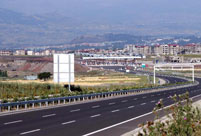 Beautiful Chinese-built roads in Africa
Beautiful Chinese-built roads in Africa Sagya Monastery in Tibet
Sagya Monastery in Tibet
 Young Chinese drive consumption
Young Chinese drive consumption
 The life of a model: Not as glamorous as it seems
The life of a model: Not as glamorous as it seems
 Hello Kitty, happy 40th birthday!
Hello Kitty, happy 40th birthday!
 The Western Qing Mausoleum
The Western Qing Mausoleum
 Avant-garde approach to graduation photos
Avant-garde approach to graduation photos
 Early PLA posters, signatures of an era
Early PLA posters, signatures of an era
 First Russian Street in Tianjin open to public
First Russian Street in Tianjin open to public
 Motorcycle stunt on the Bund
Motorcycle stunt on the Bund
BEIJING, May 8 -- An upgraded version of all-around cooperation between China and Africa, proposed by Chinese Premier Li Keqiang during his current Africa tour, is rooted in equality, mutual benefit and common development.
Currently, with the reform of the Chinese economy and the development of the African economy, bilateral economic and trade relations have presented new characteristics with expanding complementarity.
On the one hand, a lot of African economies at take-off stage are eager to develop industries and construct and improve infrastructure. On the other, the Chinese economy, in a process of transformation, needs to ease pressure from overcapacity of its manufacturing and construction industries.
"China is grasping opportunities from the take-off of the African economy and Africa is absorbing energy from China's economic restructure," said Zhou Yongsheng, a professor with China Foreign Affairs University.
In recent years, China-Africa economic and trade cooperation has become comprehensive, strategic and beneficial to the two peoples.
Bilateral cooperation has enjoyed broad development in mining, crops, animal husbandry, water resources, personnel training, technological transfer, reduction of poverty, environmental protection, medical treatment and education, among others.
To support the construction of infrastructure in Africa, China has offered significant preferential and commercial loans. From 2010 to May 2012, China provided preferential loans for 92 projects, worth a total of 11.3 billion U.S. dollars.
China also has endeavored to increase imports from Africa through such means as tax exemptions and trade promotions for African products.
Since January 2012, China has exempted tariffs on 60 percent of the products imported from the 30 least developed countries in Africa that have diplomatic ties with China.
China's engagement in Africa has earned support from some Western institutions, which hold it is wiser and more sustainable than the West's.
A study published recently on the website of RAND, a nonprofit American institution, said Chinese aid to Africa was more visible than U.S. and Western aid.
"In addition to the construction of high-profile facilities, such as parliament buildings, conference centers, and football stadiums, Chinese funds often enable large-scale construction and infrastructure initiatives that have the potential to benefit the public through job creation and improved services (transportation, electricity, etc.)," the report said.
"Though some Western aid leads to similar projects, the long and onerous oversight processes for such large investments means that fewer of them are undertaken," it said.
In the eyes of Africans, their Chinese brothers, uncomplaining and unconcerned by hardships and the need for great commitment, are genuinely focused on the long-term development of the African economy and society.
The words of the Guinean mines minister quoted by journalists Serge Michel and Michel Beuret in their book "China Safari" may reflect what Africans feel about China and the West.
The Chinese "are the only ones who offer us 'package' deals or turnkey contracts: a mine, a hydroelectric dam, a railroad, and a refinery -- all financed by the China Exim Bank, which is paid in alumina ... When we ask Alcoa (an American aluminum producer) for the same thing, they say that their business is aluminum, not hydroelectric dams," the minister said.
Todd Moss, U.S. deputy assistant secretary of state for African affairs, said in 2012 that Chinese and U.S. economic activities were actually complementary.
"I think in private there is very little U.S. concern about what China is doing in Africa," Moss told the New York Times. "The U.S. is not going to build highways and bridges and airports, and that is something Africa needs, so we should be grateful that the Chinese are doing this."
Indeed, China-Africa economic and trade cooperation not only produces a win-win result but also benefits all stakeholders. China and the West are contenders in Africa but such competition is not a "zero-sum" game.
Therefore, it is inconceivable that some Westerners describe China's normal economic activities and even some projects supported and constructed by China to "neocolonialism."
Australian economist Guo Shengxiang said Western colonists used to intentionally contain the development of local economy to better exploit resources in Africa, which caused the narrowness of its economic structure and fragility of its infrastructure.
The concepts of colonialism and neocolonialism, both based on the purpose of harming others to benefit oneself, should be abandoned in a globalized era, Guo said.
China-Africa economic and trade cooperation conformed to economic rules, helped enhance Africa's negotiating power, expanded market competition, broke the Western monopoly, promoted employment and reduced poverty, which deserved understanding and praise, Guo said.
China has a different concept, thus different policies on Africa than the West. China-Africa relations, combined with benefits and responsibilities, will eventually contribute to the sustainable development of Africa, global economic governance and economic recovery.
 When we are young...
When we are young... Solar halo occurs in Lhasa
Solar halo occurs in Lhasa Photos give cheongsam a new life
Photos give cheongsam a new life Graduates bid farewell to campus in clown costume
Graduates bid farewell to campus in clown costume Badain Jaran Desert: Amazing curves of nature
Badain Jaran Desert: Amazing curves of nature Beautiful Chinese-built roads in Africa
Beautiful Chinese-built roads in Africa High fashion trend welcomed by costumers in Changsha
High fashion trend welcomed by costumers in Changsha About 100 cubs expected to be born in NE China's Siberian Tiger Garden
About 100 cubs expected to be born in NE China's Siberian Tiger Garden China wins 19th women's team title at table tennis worlds
China wins 19th women's team title at table tennis worlds The 'Chinese Dad'
The 'Chinese Dad' Chinese mountaineer's gear list
Chinese mountaineer's gear list  Newly recruited police in Hetian hold drill
Newly recruited police in Hetian hold drill  China's most luminous celebrities
China's most luminous celebrities Top 10 most expensive cars in the world
Top 10 most expensive cars in the world 'African Street' in Guangzhou
'African Street' in GuangzhouDay|Week|Month